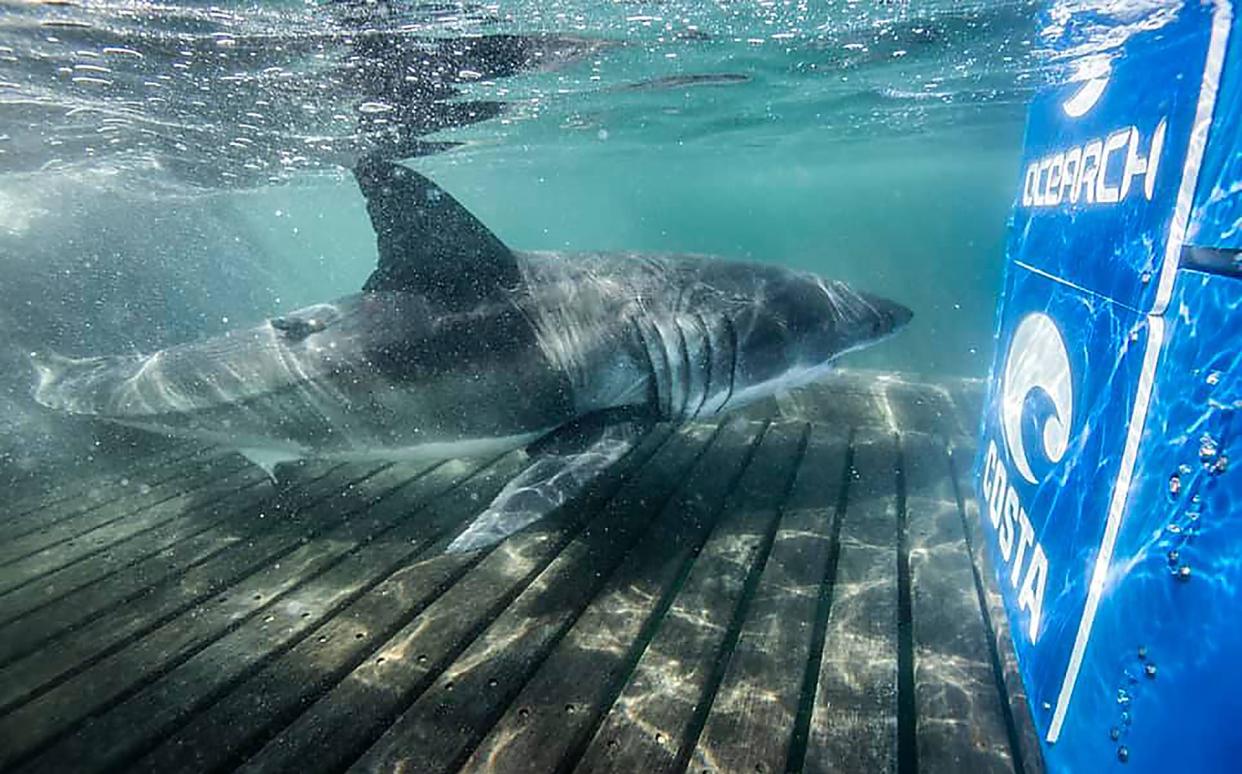Great white shark Rose pings again off Florida, near St. George Island in Gulf of Mexico
Hello again, Rose!
The 10-foot great white shark, tracked by the research group OCEARCH, has pinged for the third time in 8 days in the Gulf of Mexico, this time off St. George Island at 6:58 a.m. Monday, March 11.
A ping means the satellite tag attached to the shark's dorsal fin by scientists broke the water long enough to send location data to trackers.
Rose previously pinged off Cape Coral on March 3 and Sarasota on March 5.
On its way to the Gulf, Rose was tracked off the Treasure Coast Feb. 17 and 18 and Boynton Beach Feb. 19. The shark's tracker shows it's been spending winters around the Sunshine State since 2021, including the Gulf of Mexico in 2022 and 2023.
Here's what to know about Rose, OCEARCH and white sharks in Florida.
More about OCEARCH great white shark Rose

White shark Rose was tagged by OCEARCH scientists on Oct. 4, 2020, off Lunenburg, Nova Scotia.
According to OCEARCH, the shark was named after Rose Bay near where it was tagged.
At the time, Rose measured 10 feet 5 inches, weighed 600 pounds and was classified as a juvenile shark.
Great white sharks can grow up to 20 feet long, but most are smaller with adult females averaging 15-16 feet long and males reaching 11-13 feet.
Rose has traveled 15,471 miles since scientists began tracking it in 2020.
Sharks in the Sunshine State: As spring breakers descend on Florida beaches, great white sharks pop up along coast
Where is St. George Island, Florida?
St. George Island is a barrier Island in Franklin County on Florida's Forgotten Coast, about 76 miles southwest of Tallahassee.
Great white shark facts
Things to know about white sharks, according to NOAA Fisheries:
White sharks grow slowly. Males mature at around 26 years old and females at around 33 years old. Life expectancy is difficult to determine but is estimated to be between 30 and 70 years.
White sharks are about 4 feet long at birth but can grow up to about 20 feet long and weigh over 4,000 pounds.
White sharks eat an opportunistic diet of fish, invertebrates and marine mammals.
White sharks are partially warm-blooded and can maintain their internal body temperature above that of the surrounding water. This allows them to be more active in cooler waters than cold-blooded species.
Are there great white sharks in Florida?
Yes. Great white sharks migrate south when the water gets cold and food sources become scarce up north, according to OCEARCH chief scientist Dr. Bob Hueter.
Think of them as the snowbirds of sharks.
Most of them tend to stay away from the beaches in continental shelf waters, Hueter said.
What is OCEARCH?
OCEARCH is a nonprofit research organization studying the ocean's giants.
The group studies great white sharks and other keystone species essential for the health of the oceans.
OCEARCH recently finished up its 46th expedition, dubbed Expedition Southeast. It departed from Jacksonville on Nov. 17 and made its final docking in Morehead City, North Carolina on Dec. 15.
During the expeditions, researchers collected previously unattainable data on the animals' migrations, reproductive cycle, genetic status, diet, abundance, and more.
"If we lose the apex predator (sharks) then we lose all our fish and then there are no fish sandwiches for our grandchildren," OCEARCH founder Chris Fischer told the Courier Journal. "That's oversimplified, of course, but the idea is important because many shark species are threatened by overfishing and a demand for shark fins in Asia. Their dwindling numbers jeopardize ocean habitats."
Most shark attacks happen in Florida
There were 69 documented unprovoked shark attacks around the globe in 2023. The U.S. led the world with 36 attacks and Florida again was the state with the most bites at 16.
Florida shark attacks by county:
Miami-Dade County: 1
Pinellas County: 1
While the U.S. has the most attacks, South Africa has the most shark-related fatalities.
Since 1992, there have been 1,232 shark bites worldwide, according to data from floridapanhandle.com, with white sharks credited as the top biters.
Support local journalism by subscribing to a Florida news organization.
This article originally appeared on Fort Myers News-Press: Sharks in Florida: Great white shark surfaces off St. George Island
